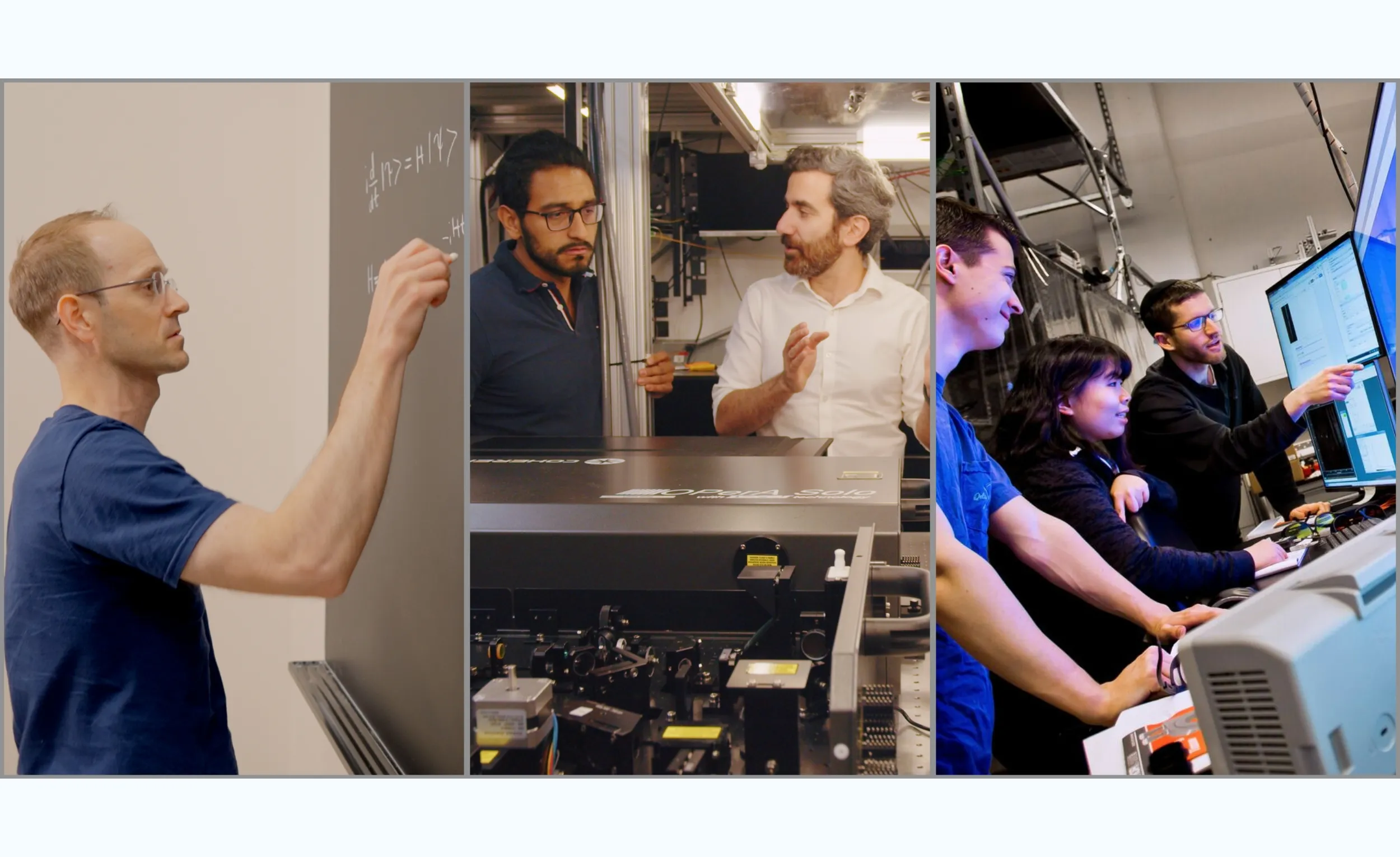
Center: RQS Senior Investigator Mohammad Hafezi discusses research with graduate student in his lab.
Right: UMD undergraduate students engage in quantum research.
A cornerstone of quantum research, education and innovation at the University of Maryland is set to expand its activities with additional financial support from the federal government.
The Quantum Leap Challenge Institute for Robust Quantum Simulation (RQS)—launched in 2021 with a $25 million award from the National Science Foundation—has received a $2.5 million supplemental NSF award that will jumpstart several new research thrusts and an undergraduate research program.
This new funding strengthens the institute’s efforts in quantum simulation—a fundamental step toward realizing a world where quantum computers can predict the behavior of complex quantum systems, potentially revolutionizing the study of chemistry, materials, and high-energy physics. Even the most powerful of today’s “classical” computers struggle to represent even relatively small quantum systems, an obstacle that could be overcome by building next-generation quantum simulators.
“The promise of quantum simulation as an indispensable tool for exploring the behavior of systems with strong quantum effects makes it a central intellectual challenge,” says Andrew Childs, a professor of computer science at UMD and the director of RQS. “We’re thankful for the strong federal support we’ve received to address this challenge, and will continue to forge a path toward scalable, fault-tolerant quantum computation.”
Ongoing research in RQS involves both theoretical and experimental work that spans computer science, engineering and physics. The institute joins quantum experts from the University of Maryland (lead institution), Duke University, Princeton University, North Carolina State University and Yale University, as well as researchers from the National Institute of Standards and Technology (NIST).
The NSF supplemental funding will support new discoveries in quantum simulation with logical qubits and quantum simulations of lattice fermion systems.
The logical qubits effort is led by Michael Gullans, a physicist at NIST and a senior investigator in RQS. The goal, Gullans says, is to rapidly accelerate the development of quantum simulation using logical, error corrected, and noise-robust qubits.
Plans call to push the state-of-the-art in tests of quantum advantage and quantum simulation using logical qubits, improve overheads in quantum simulation with low-density parity check codes through theory and co-design with experiment, as well as make key hardware improvements that are needed for the next generation of experiments using error correction in Rydberg tweezer arrays.
These efforts will set the stage for transformative developments in noise-robust quantum simulation and computation and make a key step toward eventually solving real-world computational problems using quantum simulation platforms, Gullans says. He notes that the close ties and varied partnerships of the RQS team with industry groups working on quantum computing can offer a variety of pipelines from these academic efforts to industry.
A second research thrust will focus on strongly interacting fermions—a basic type of particle, such as the electron, that is ubiquitous in quantum physics—and will add two new experimental platforms to RQS for conducting analog quantum simulations.
Mohammad Hafezi, a professor of physics and electrical and computer engineering at UMD and a senior investigator in RQS, will lead these efforts, with assistance from quantum faculty at UMD and Princeton.
The Fermi-Hubbard model serves as a notable illustration of a useful quantum simulation, Hafezi says, given its pertinence to numerous condensed matter systems and its challenging classical nature. The aim of the RQS effort is to examine two experimental platforms—one based on solid-state systems and the other on ultracold atoms—both governed by similar Hamiltonians with comparable dynamics and many-body physics. The researchers believe that this setup enables the investigation of analogous physical phenomena and the possibility of sharing insights between the two domains.
A third effort supported by the supplemental NSF award will increase the number of undergraduate students participating in RQS research. Erin Sohr, the assistant director of education in RQS, is leading the institute’s efforts to create an undergraduate research experience (REU) program within RQS groups at the University of Maryland.
This REU will create a cohort of undergraduates across multiple subdisciplines in quantum simulation, who will be embedded into existing RQS projects for up to one year and mentored by graduate students, postdocs and faculty members. Over the course of the REU, they will see their work contribute to the broader enterprise of the group’s research and learn about the structure and scope of a fully realized research project.
In addition to their work in their assigned research group, students will also participate in a series of cohort-building activities with other undergraduates in the program, including lunches and meetups at RQS events. As a capstone to the REU, each of these undergraduates will create and present a poster at an RQS research showcase, to be attended by undergraduates, graduate students, postdocs, and faculty working in areas of quantum information science and engineering.
About RQS
The NSF Quantum Leap Challenge Institute for Robust Quantum Simulation (RQS) is conducting groundbreaking research and scholarship involving three interrelated scientific challenges:
• Developing and deploying methods to certify the correctness of quantum simulations and ensuring the trustworthiness of simulations even when classically intractable.
• Exploring quantum error correction as a physical phenomenon using a statistical mechanics perspective on the simulator-environment interaction.
• Designing algorithms, error correction protocols and software tools for carrying out quantum simulations and put them into practice in simulations on diverse hardware platforms, demonstrating quantum computational advantage and laying the groundwork for even larger-scale future quantum simulators.
RQS also has a strong education and outreach component, hosting annual workshops and summer school programs, and having RQS faculty and staff visit regional K–12 schools to spark an interest in quantum mechanics and quantum information science.
This includes a quantum activity kit distributed to middle and high schoolers throughout the Delaware/Maryland/Virginia region, offering the opportunity to hypothesize and explore quantum mechanics via the laws of light, with participants layering and experimenting with four polarizing filters.
RQS receives administrative and technical support from the University of Maryland Institute for Advanced Computer Studies.